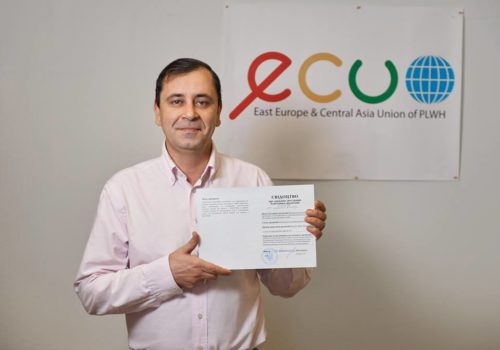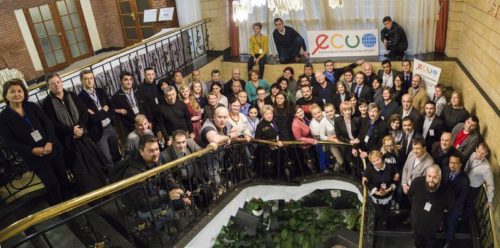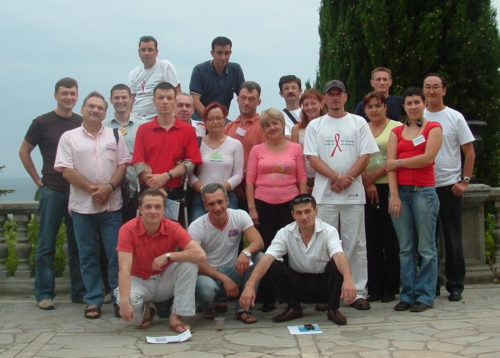July 31 is the 10th anniversary of the largest community of patients’ organizations – ECUO, uniting the community of people living with HIV in Eastern Europe and Central Asia. Today, the network of organizations defends the right to affordable treatment and a decent life of more than 1 million 600 thousand HIV-positive people

According to UNAIDS, the EECA region is the only one in the world with growing numbers of new HIV cases and AIDS-related deaths.
How the HIV issue has changed over the past decade in the region, the interaction with governments and international organizations, human rights and trends in the fight against epidemics – the President of ECUO, Vladimir Zhovtyak and senior adviser of ECUO Natasha Leonchuk, people who came from the founding of the HIV community in Eastern Europe and Central Asia, discuss these matters.
HIV is a relatively new challenge for the mankind. Historically, you created the first patients’ organizations, and accordingly needed to find solutions to the completely new challenges for the society. To what extend has the PLHIV community’s agenda changed over the past decade?
VZh: At the beginning of the two thousandth’s, for the majority of the people living in Eastern Europe and Central Asia, antiretroviral treatment, being vital for people with HIV, was not available.
At that time, the Ukrainian community of PLHIV began its active work and soughed from governments and international donors the inclusion of ARV therapy to the national HIV/AIDS programs. By observing the effectiveness of this efforts, the activists from various countries of the region began to address us. In 2005, we created an informal association of organizations, and in 2007 the communities of the region initiated the creation of the ECUO, which systematically began to advocate the interests of PLHIV in Eastern Europe and Central Asia.
NL: To describe the situation in figures, in 2007, only 15% of people in need of antiretroviral treatment were receiving it. At that time, the EECA region was the last but one in access to treatment. Unfortunately, the situation has not changed dramatically. According to the latest UNAIDS data published a few days ago, only 28% of PLHIV have access to treatment in our region.

Why the issue of access to treatment was not solved for the past decade?
NL: There is a range of reasons, one of the leading: high cost of antiretroviral treatment. Despite the fact that the sexual way of transmission is growing, the epidemic in our region is concentrated among the groups most vulnerable to HIV: people who use injecting drugs, MSM and sex workers who do not trust health care. They face discrimination and stigmatization, and therefore do not turn to medical facilities for treatment. Another problem is that HIV-positive people do not know about their status. Naturally, if they do not know about their disease, they can not get help.
VZh: And if they can not get treatment, it means that they transmit HIV to others. And if you take ARV therapy, then the amount of the virus in the body becomes insufficient for HIV transmission to another person.
ECUO consistently maintains an open dialogue with governments and politicians. What is the efficiency of this communication?
NL: The results of our work sometimes becomes noticeable a few years later after the negotiations and discussions with representatives of governments and international organizations. Speaking about the ultimate mission of our organization it is to ensure the quality life for PLHIV through mobilization and support of PLHIV communities in the countries of our region. The challenges of access to antiretroviral treatment can not be solved separately by countries, politicians, pharmaceutical companies, donor organizations, or the communities. We see the progress, of course. Still, over the past decade, access to treatment has increased by 15%, but, unfortunately, people become infected with HIV with much greater progression than the access to treatment becomes possible. Why does this happen? Governments and societies have long believed that people who use drugs, MSM, sex workers do not have the right for a decent life, health, and other basic values. Therefore, the authorities paid little attention to HIV/AIDS issues, the problems of these groups of people lose priority over other challenges of the states and other diseases. If we talk about the efficiency in cooperation with state institutions, then it certainly exists. Practically all countries of the EECA region have effective programs to support people living with HIV, despite the fact that most of them are financed by international donors, but in some countries, they are implemented for the state budget.
VZh: Throughout these ten years, we remain pioneers and actualize these questions that, apart from us nobody raises. It happened that me and Natasha Leonchuk were involved in the receipt of a World Bank loan in 2000 by Ukraine. When negotiations were under way, participants did not have an understanding of the importance to finance the antiretroviral treatment. Thus, the head of the World Bank office of that period said that the purchase of ARV drugs can not enter into credit as one of the directions, because it is not economically effective to treat HIV-infected people in Ukraine. We had a different view, and we defended it, so the needed funds were allocated to purchase ARV drugs. Within years, the rhetoric has changed, and funding for antiretroviral treatment has become a global priority worldwide for the donor organizations and governments. For example, we can talk about ECUO’s strategy formed in 2010. We set the goal that in the countries of the region there should be a transition of funding the ARV therapy from the international donors to the state, becoming a priority for the nations.

Eastern Europe and Central Asia is the region of middle-income countries. How it happened that for a long time the health and social challenges of citizens of these countries are not solved at the expense of the state budget, but are funded by international donors such as the Global Fund?
NL: In 2007, 95% of medicines were purchased by the Global Fund resources, however, nowadays almost all countries of Eastern Europe and Central Asia, with the exception of Tajikistan and Armenia, purchase antiretroviral drugs for their own state budget. It is a very important change that took place during ten years of the ECUO’s existence. It is a positive change that also brought new challenges related to your question about the fact that the countries of the region are not poor and are able to spend money to solve problems of citizens. As it turned out, it is not true. There is a high level of corruption in the purchase of ARV drugs, which is one of the reasons why money allocated for the purchase of drugs for the treatment of HIV and other diseases are not used effectively. In addition, our region has very low access to modern antiretroviral drugs, because of their very high cost. And another challenge for our organization: drugs are not always purchased regularly, while HIV treatment, like diabetes, should be continuous – you need to take the medication regularly at one and the same time.
In South Africa, the HIV epidemic has not been stopped, until it became a personal problem of Nelson Mandela family. How crucial is the personal factor in overcoming the epidemic?
NL: According to the experience of PLHIV communities, people being personally affected deal with this issue mostly. The epidemic has reached such a level that among politicians there are people affected by HIV, or living with the virus, or who are at risk. This disease is stigmatized, although the attitude of the society is slowly, but changing. I do not know what should happen, so that our politicians start talk openly about this issue, and demonstrate their involvement in HIV. There are such people, and we are familiar with them, but they are not ready to open their status.
HIV is not only and not so much a medical issue, but also the thorny issue of human rights.
NL: That is correct, the majority of people do not trust the health care system and there are good reasons for it. In many countries of the region there is still legislation that discriminates HIV-positive citizens. First of all, this concerns injecting drug users, MSM and sex workers.
VZh: HIV should be decriminalized. What kind of criminal punishment for infection can there be, if there is a so-called window period in HIV infection, when HIV can not be diagnosed from three to six months. A person may not know that he/she is sick, even if he/she tests every day. The participants are responsible parties for safe or dangerous sex.
What are the ECUO’s priorities for the next decade?
NL: First of all, it is necessary to provide access to treatment for all who need it. It should be qualitative, modern and at a wise cost.
It is extremely important that as many people as possible have the opportunity to learn about their HIV status timely and receive the necessary treatment under favorable conditions. And this in turn makes it possible to prolong life, improve its quality and prevent the transmission of the virus to other people.
VZh: To create a single advocacy plan in Eastern Europe and Central Asia, we have consolidated the potential of PLHIV communities of all countries to remove barriers to HIV treatment, care and prevention.
You can not defeat one infectious disease, if you do not pay proper attention to other infections. To date, the world, and our region in particular, has been plagued by three epidemics: HIV, tuberculosis and hepatitis.
Therefore, we need to integrate necessary changes into a single regional advocacy plan that can stop the epidemics of HIV, tuberculosis and hepatitis. Our priorities remain timely diagnostics and effectiveness of health systems, which should be targeted at patients. And most importantly, in the modern world, people living with HIV should not feel like outcasts – they are equal among equals!
Interviewed by Alexander Stasov.
31.07.2017
